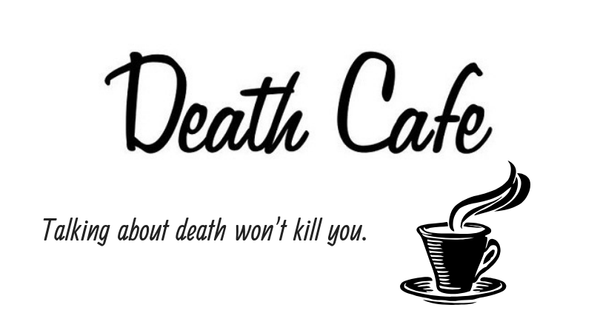 Back in 2018, I wrote about a concept called the Death Cafe. Here’s the website.
Back in 2018, I wrote about a concept called the Death Cafe. Here’s the website.
“At a Death Cafe people drink tea, eat cake and discuss death. Our aim is to increase awareness of death to help people make the most of their (finite) lives”
Although I only attended a single event in person, I’ve been to about a half dozen sessions remotely. I’ve even facilitated a couple of breakout sessions since one wants no more than 4-6 people in a given virtual room.
The last session organized by the Albany group in may had people from New York City and central Europe. It is one of those rare events that, arguably, might be enhanced by Zoom.
One relays stories, largely to strangers, which is oddly therapeutic. I might tell of some specific disappointment about an absence at a recent funeral. It might be easier to share the story there than in this blog.
Food
I could talk about the tons of food that were brought to my parents’ house after my father died in August 2000. I specifically remember that someone came by at 10:30 pm, my mother looking exhausted from the day.
Conversely, almost no food was brought to my MIL’s house in April 2020 after my FIL died. It wasn’t just different norms between North Carolina and upstate New York, plus the passage of time. There was a pandemic, so the extended family wasn’t at her home. On the other hand, a pair of my wife’s friends brought us some food, delivered appropriately in a socially distanced manner.
Back in 2012, Jaquandor reviewed Making Piece: A Memoir of Love, Loss, and Pie by Beth Howard. It’s a lovely reflection, which you should read.
Ken Levine on the sudden death of his friend Arlen Peters: “Order the pie. You never know.”
My May 31 post has a few more examples.
AmeriNZ
One of those food narratives was linked from Arthur’s blog, He’s been writing a LOT about death, bravely and quite insightfully. For instance, he wrote about people being very good actors. “We learn what to say, how not to say things, and how to present ourselves in a way that the people in our lives expect. We learn, in other words, how not to be real.”
Or finding the right words. “I’ve seen many people dealing with profound grief who say that they stop talking about their grief journey because they sense that the people they talk to don’t want to hear about it, or else they’re visibly uncomfortable. In such cases, the grieving person will, essentially, adopt what they see as the socially expected behavior: Silence.”
And there are others.
My point in linking to these is that talking about issues surrounding death doesn’t glorify death. It contextualizes death in this world rather than making it a verboten topic.
If you’re so inclined, check out a Death Cafe. There will be an in-person one (finally) in Albany County very soon.


 “Is ‘orbisculate’ a word? The late Neil Krieger’s children want it to be.” That’s the title of a recent
“Is ‘orbisculate’ a word? The late Neil Krieger’s children want it to be.” That’s the title of a recent  My friend
My friend  There’s an article,
There’s an article,